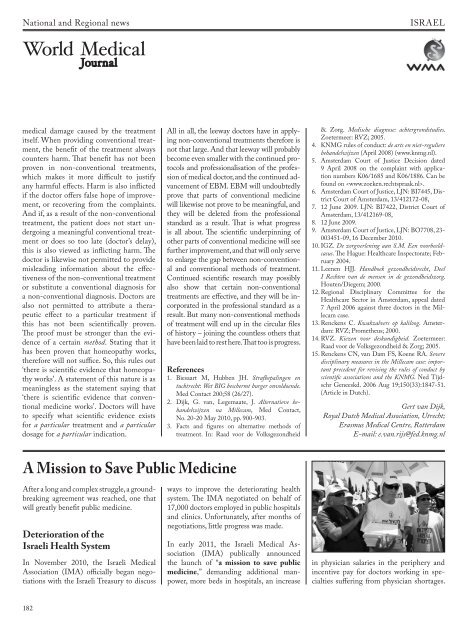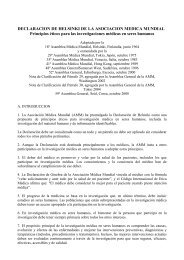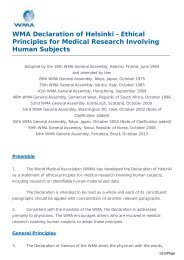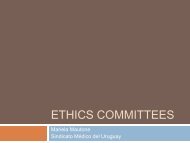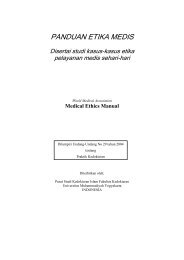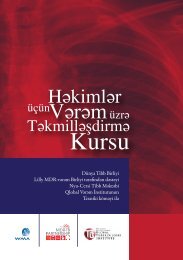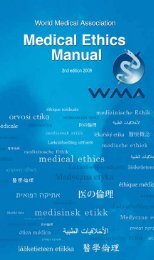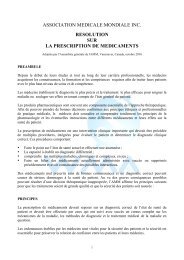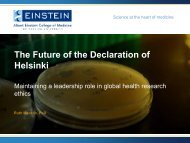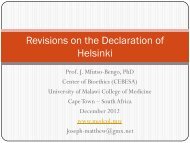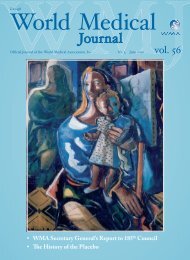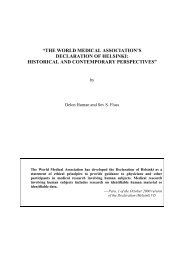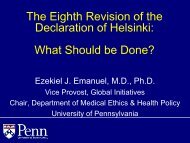WMJ 05 2011 - World Medical Association
WMJ 05 2011 - World Medical Association
WMJ 05 2011 - World Medical Association
You also want an ePaper? Increase the reach of your titles
YUMPU automatically turns print PDFs into web optimized ePapers that Google loves.
National and Regional news<br />
ISRAEL<br />
medical damage caused by the treatment<br />
itself. When providing conventional treatment,<br />
the benefit of the treatment always<br />
counters harm. That benefit has not been<br />
proven in non-conventional treatments,<br />
which makes it more difficult to justify<br />
any harmful effects. Harm is also inflicted<br />
if the doctor offers false hope of improvement,<br />
or recovering from the complaints.<br />
And if, as a result of the non-conventional<br />
treatment, the patient does not start undergoing<br />
a meaningful conventional treatment<br />
or does so too late (doctor’s delay),<br />
this is also viewed as inflicting harm. The<br />
doctor is likewise not permitted to provide<br />
misleading information about the effectiveness<br />
of the non-conventional treatment<br />
or substitute a conventional diagnosis for<br />
a non-conventional diagnosis. Doctors are<br />
also not permitted to attribute a therapeutic<br />
effect to a particular treatment if<br />
this has not been scientifically proven.<br />
The proof must be stronger than the evidence<br />
of a certain method. Stating that it<br />
has been proven that homeopathy works,<br />
therefore will not suffice. So, this rules out<br />
‘there is scientific evidence that homeopathy<br />
works’. A statement of this nature is as<br />
meaningless as the statement saying that<br />
‘there is scientific evidence that conventional<br />
medicine works’. Doctors will have<br />
to specify what scientific evidence exists<br />
for a particular treatment and a particular<br />
dosage for a particular indication.<br />
All in all, the leeway doctors have in applying<br />
non-conventional treatments therefore is<br />
not that large. And that leeway will probably<br />
become even smaller with the continued protocols<br />
and professionalisation of the profession<br />
of medical doctor, and the continued advancement<br />
of EBM. EBM will undoubtedly<br />
prove that parts of conventional medicine<br />
will likewise not prove to be meaningful, and<br />
they will be deleted from the professional<br />
standard as a result. That is what progress<br />
is all about. The scientific underpinning of<br />
other parts of conventional medicine will see<br />
further improvement, and that will only serve<br />
to enlarge the gap between non-conventional<br />
and conventional methods of treatment.<br />
Continued scientific research may possibly<br />
also show that certain non-conventional<br />
treatments are effective, and they will be incorporated<br />
in the professional standard as a<br />
result. But many non-conventional methods<br />
of treatment will end up in the circular files<br />
of history – joining the countless others that<br />
have been laid to rest here. That too is progress.<br />
References<br />
1. Biesaart M, Hubben JH. Strafbepalingen en<br />
tuchtrecht: Wet BIG beschermt burger onvoldoende.<br />
Med Contact 200;58 (26/27).<br />
2. Dijk, G. van, Legemaate, J. Alternatieve behandelwijzen<br />
na Millecam, Med Contact,<br />
No. 20-20 May 2010, pp. 900-903.<br />
3. Facts and figures on alternative methods of<br />
treatment. In: Raad voor de Volksgezondheid<br />
& Zorg. Medische diagnose: achtergrondstudies.<br />
Zoetermeer: RVZ; 20<strong>05</strong>.<br />
4. KNMG rules of conduct: de arts en niet-reguliere<br />
behandelwijzen (April 2008) (www.knmg.nl).<br />
5. Amsterdam Court of Justice Decision dated<br />
9 April 2008 on the complaint with application<br />
numbers K06/1685 and K06/1886. Can be<br />
found on .<br />
6. Amsterdam Court of Justice, LJN: BI7445, District<br />
Court of Amsterdam, 13/412172-08,<br />
7. 12 June 2009. LJN: BI7422, District Court of<br />
Amsterdam, 13/412169-08,<br />
8. 12 June 2009.<br />
9. Amsterdam Court of Justice, LJN: BO7708, 23-<br />
003451-09, 16 December 2010.<br />
10. IGZ. De zorgverlening aan S.M. Een voorbeeldcasus.<br />
The Hague: Healthcare Inspectorate; February<br />
2004.<br />
11. Leenen HJJ. Handboek gezondheidsrecht, Deel<br />
I Rechten van de mensen in de gezondheidszorg.<br />
Houten/Diegem; 2000.<br />
12. Regional Disciplinary Committee for the<br />
Healthcare Sector in Amsterdam, appeal dated<br />
7 April 2006 against three doctors in the Millecam<br />
case.<br />
13. Renckens C. Kwakzalvers op kaliloog. Amsterdam:<br />
RVZ; Prometheus; 2000.<br />
14. RVZ. Kiezen voor deskundigheid. Zoetermeer:<br />
Raad voor de Volksgezondheid & Zorg; 20<strong>05</strong>.<br />
15. Renckens CN, van Dam FS, Koene RA. Severe<br />
disciplinary measures in the Millecam case: important<br />
precedent for revising the rules of conduct by<br />
scientific associations and the KNMG. Ned Tijdschr<br />
Geneeskd. 2006 Aug 19;150(33):1847-51.<br />
(Article in Dutch).<br />
Gert van Dijk,<br />
Royal Dutch <strong>Medical</strong> <strong>Association</strong>, Utrecht;<br />
Erasmus <strong>Medical</strong> Centre, Rotterdam<br />
E-mail: e.van.rijs@fed.knmg.nl<br />
A Mission to Save Public Medicine<br />
After a long and complex struggle, a groundbreaking<br />
agreement was reached, one that<br />
will greatly benefit public medicine.<br />
Deterioration of the<br />
Israeli Health System<br />
In November 2010, the Israeli <strong>Medical</strong><br />
<strong>Association</strong> (IMA) officially began negotiations<br />
with the Israeli Treasury to discuss<br />
ways to improve the deteriorating health<br />
system. The IMA negotiated on behalf of<br />
17,000 doctors employed in public hospitals<br />
and clinics. Unfortunately, after months of<br />
negotiations, little progress was made.<br />
In early <strong>2011</strong>, the Israeli <strong>Medical</strong> <strong>Association</strong><br />
(IMA) publically announced<br />
the launch of “a mission to save public<br />
medicine,” demanding additional manpower,<br />
more beds in hospitals, an increase<br />
in physician salaries in the periphery and<br />
incentive pay for doctors working in specialties<br />
suffering from physician shortages.<br />
182


